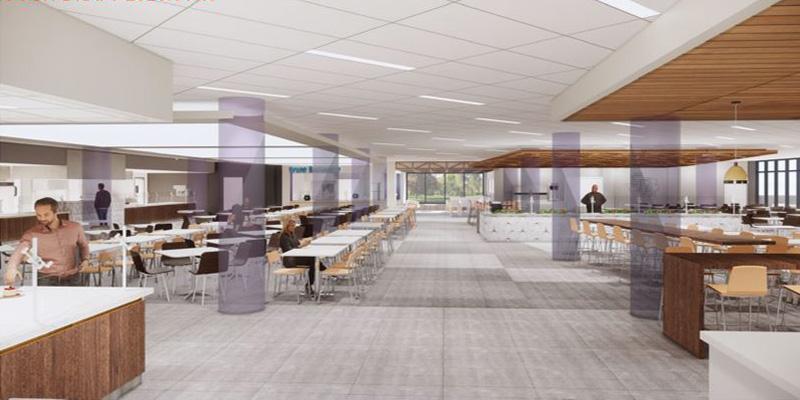NACOGDOCHES, Texas — A station completely free of seven major food allergens is one of several new features in an extensive, ongoing renovation to Stephen F. Austin State University’s Baker Pattillo Student Center dining hall.
Other major features include a dedicated “plant-forward” produce station to replace the former salad bar, a redesigned bakery allowing for confectionary pickup orders, a meat carvery station that will focus on lean meats, and the implementation of various physical distancing and health safety measures.
Construction began in April and is scheduled to be complete before the start of the fall semester.
“Because there are millions of people with food allergies, we knew we needed to better serve our students by having a more inclusive concept in the dining hall,” explained Carrie Charley, SFA’s director of auxiliary services. “In a commercial kitchen, it is nearly impossible to prevent cross-contamination. At this new allergen-aware station, all ingredients are kept separate from other dining hall menu items from the moment they arrive on the student center’s back dock until the moment the dish is served.”
The innovative meals offered through the station will be free of seven of the eight most common food allergens: milk, egg, peanut, tree nut, soy, wheat and shellfish. The eighth allergen, finfish, was kept to provide sufficient protein variety, Charley said.
“For the past several years, we’ve been tracking how many students have dietary restrictions, and that number has increased,” said Jill Hamilton, an Aramark senior specialist registered dietitian. “The allergen awareness station was added to make it easier for those with restrictions to identify offerings. Even if someone doesn’t have an allergy, I think they will still enjoy the station.”
While some dietary restrictions are based on a diner’s personal preferences, food allergies are not, and exposure to certain food products can be potentially dangerous to students with those allergies. Allergen-aware staff members will prepare dishes using dedicated kitchenware and utensils that have been thoroughly washed and sanitized between uses.
SFA has, for years, utilized allergen and nutritional information cards, which are placed near each dish at dining hall stations. The new dedicated station is the next step toward ensuring increased levels of student health awareness and dietary flexibility.
While universities nationwide are expanding their allergen-aware accommodations, SFA “might be one of the first to also use this new space as a teaching kitchen,” Charley said. “Once we are able to safely do so, we hope to host teaching tutorials and cooking competitions from this space in the evenings and during special events. We have special seating designed around the area that is movable and customizable for small groups.”
The concept of plant-forward offerings, which emphasizes “healthy plants at the center of the plate with a proportionally small quantity of animal protein,” Hamilton explained, is not a new one. SFA began adding plant-forward dishes two years ago, including such offerings as lentil “meat” loaf, grilled veggie skewers and cauliflower wings.
Several other stations in the dining hall also offer plant-forward dishes, but the newly revamped and expanded plant-forward produce station will provide a dedicated space for and expansion of these offerings. It also provides more flexible and diverse options for vegan and vegetarian diets, although every station also includes a vegan dish.
“I am super excited about the new produce station,” Charley said. “According to Dataessential, nearly 40% of Americans say they are eating less red meat and are seeking more vegetables. This trend is called ‘plant forward,’ putting plants (fruits, veggies, whole grains, nuts, beans) at the center of your plate. This renovation bursts open the doors to new possibilities for dining on our campus with a fresh perspective, fresh ingredients and a bright new landscape to enjoy meals together.”
Aside from expanding food options, the student center dining hall renovation also has updated food service procedures and modernized seating and dining aesthetics.
“The entrance to the dining hall has been expanded by 16 feet and provides a more open view into the entire facility,” Charley said. “There are three self-check-in stations and also pre-packaged to-go meals available.”
With the outbreak of COVID-19, additional safety and distancing measures were added to the renovation project, including the design of 25%, 50% and 75% capacity seating plans by architects Tipton Associates, based in Baton Rouge, Louisiana.
“With those plans, we will be able to adjust as needed before it is time to load the furniture in,” Charley said. “Most of the crowd control and occupancy management will be handled by the dining team, with the cooperation of our guests. The new check-in stations are self-swipe, and the dining team will serve food rather than having self-service, keeping things as contactless as possible. We now also have outdoor seating available facing the beautiful view down Vista Drive.”
Visual cues will be implemented throughout the hall to keep diners at a safe distance from each other. Sneeze guards have been a standard fixture in all dining halls, but extra guards were added to fill gaps.
“Face masks are required to be worn while in line and walking from station to station,” Charley added. “You also will see staff members in masks and frequently cleaning throughout the day. You might see that a station is temporarily closed during 15-minute intervals for deep cleaning and utensil replacement.”
For more information on fall 2020 dining options and updates, visit the “Dining” section on sfasu.edu/fall2020.
 Axe ’Em, Jacks!
Axe ’Em, Jacks!
